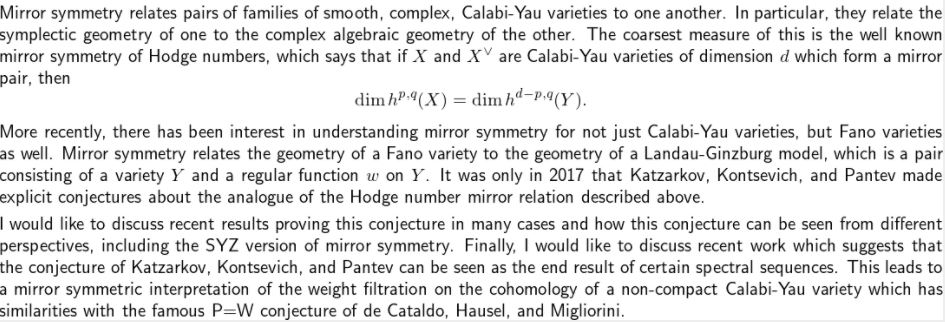CMS is organizing three-hour mini-courses to add more value to meetings and make them attractive for students and researchers to attend.
The mini-courses will be held on Thursday afternoon, December 3rd, before the public lecture, and include topics suitable for graduate students, postdocs and other interested parties. You don’t have to be registered for the meeting in order to register for mini courses.
Registration fees for the mini courses are:
Regular rate (Subject to Change) |
|||
| Students/Postdocs (members) | $25 |
||
| Students/Postdocs (non-members) | $37.50 |
||
| CMS Members | $50 |
||
| CMS Non-Members | $75 |

Facilitator: Paulina Chin, Software Architect, Maplesoft
In addition to being an interactive environment for problem-solving, visualization, and technical document preparation, Maple also features a powerful programming language that is especially useful for working with mathematics. Becoming familiar with the Maple language will allow you to increase the range and efficiency of what you can do in Maple, from writing short scripts to automating a repetitive calculation, to creating interactive applications for students and developing new algorithms to advance your research.
This course will begin with an overview of the Maple software package, highlighting a number of its important features. We will then cover the basics of the Maple language, common data structures, and writing simple programs. We will also look briefly at tools to aid the construction of larger programs and packages and the building of interactive applications in the style of Maple’s Math Apps.
Newcomers to Maple, as well as experienced users who would like to learn more about the Maple language, are welcome.
Facilitator: Andrew Harder (Lehigh University)
Moderator: Charles Doran (Harvard)

Facilitators: Michael Groechenig (University of Toronto) and Steven Rayan (University of Saskatchewan)
Speaker: Maxence Mayrand (University of Toronto)
There is a rich history of interactions between symplectic and complex geometry. One important aspect of it, Kempf-Ness type theorems, link beautifully the two natural notions “quotient spaces” in these geometries. On the one hand, symplectic reduction, which has roots in classical mechanics, can be performed when a real Lie group acts on a smooth symplectic manifold, and a choice of moment map has been made. On the other hand, Geometric Invariant Theory, which is the main tool for moduli problems in algebraic geometry, produces quotients of complex algebraic varieties by complex Lie groups upon choosing a line bundle with a lift of the action. The natural ground where both structures coexist is Kähler geometry, and in that case, there is a correspondence between these two choices so that the quotients coincide. This mini-course aims to present this result in the general context of non-compact and singular spaces, as well as in hyperkähler geometry, and to illustrate it by many examples, both finite and infinite-dimensional.
Facilitator: Marcin Sabok (McGill) and Anush Tserunyan (McGill)
Speaker: Anton Bernshteyn (Georgia Tech)
The Lovász Local Lemma (the LLL, for short) is a powerful probabilistic result that was introduced by Erdős and Lovász in 1975 and has since become an indispensable tool in combinatorics and graph theory. The LLL is mostly used to obtain existence results, and it is particularly well-suited for showing that a given structure admits a partition or a “coloring” satisfying some “local” constraints. It has recently transpired that, in addition to its applications in combinatorics, the LLL can also be quite useful in descriptive set theory and in the study of dynamical systems. The aim of this mini-course is to provide an introductory guide to the LLL for those interested in applying it in these areas.
Speakers: Mike Bennett (University of British Columbia), Stacey Smith? (University of Ottawa), and NSERC.
The student committee of the CMS has prepared a workshop on communication in mathematics. We will hear about how to write a good paper (with mathematical modelling as an example), how to write good scholarships and fellowships applications, and how the recent pandemic has influenced communication in mathematics.
© 2023 2020 CMS Winter Meeting. Built using WordPress and the Mesmerize Theme